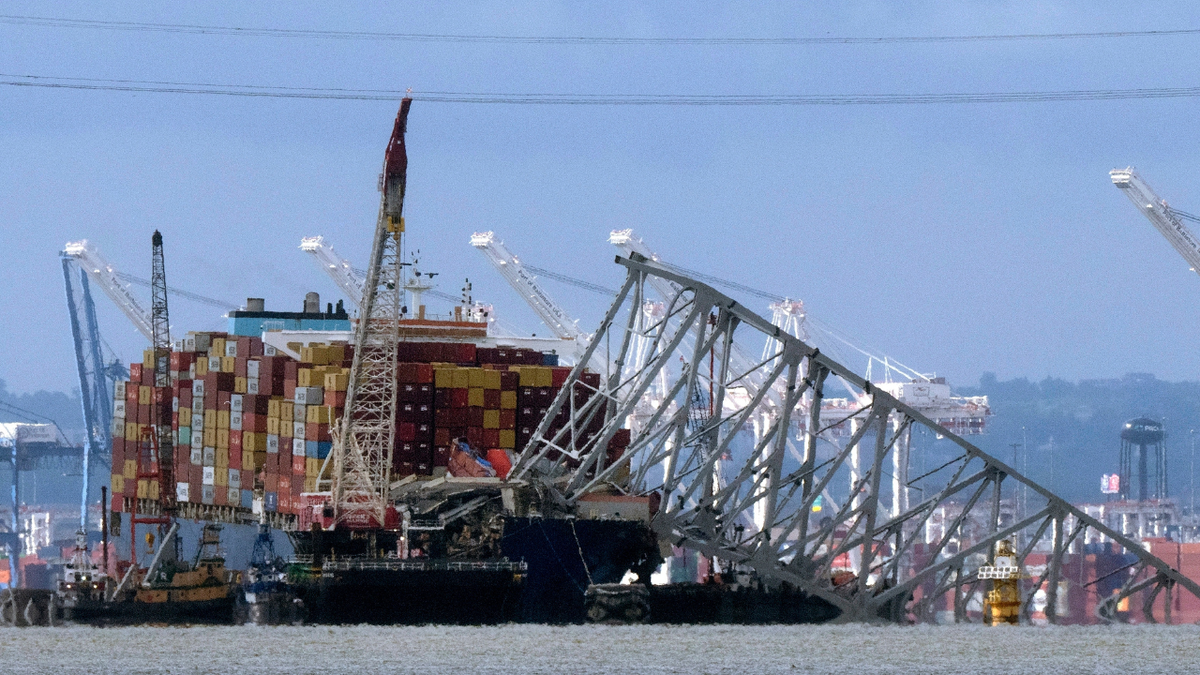Gov. Wes Moore on reopening the Baltimore Port: We get big things done here
Gov. Wes Moore, D-Md., discusses the reopening following the Francis Scott Key Bridge collapse on 'Your World.'
- The cargo ship Dali headed out of Baltimore for Virginia nearly three months after losing power and crashing into the Francis Scott Key Bridge.
- The 984-foot Dali began moving shortly before 8:30 a.m. with the assistance of four tugboats.
- The Dali was sailing under its own power with a full crew of 22 and six salvage experts, according to the U.S. Coast Guard.
The cargo ship Dali headed out of Baltimore for Virginia on Monday, nearly three months after it lost power and crashed into one of the Francis Scott Key Bridge’s supporting columns and caused the bridge to collapse.
The 984-foot Dali started moving shortly before 8:30 a.m. with four tugboats.
The Dali was sailing under its own power with a full crew of 22 and six salvage experts, the U.S. Coast Guard said in a news release.
PORT OF BALTIMORE FULLY REOPENED AFTER $100M CLEANUP OF COLLAPSED FRANCIS SCOTT KEY BRIDGE
The Coast Guard is overseeing the voyage and providing a 500-yard safety zone around the Dali during its trip.

The collapsed Francis Scott Key Bridge rests on the container ship Dali, on May 12, 2024, in Baltimore, as seen from Riviera Beach, Maryland. Dali headed out of Baltimore for Virginia on Monday, nearly three months after it lost power and crashed into one of the Francis Scott Key Bridge’s supporting columns and caused the bridge to collapse. (AP Photo/Mark Schiefelbein, File)
The Dali is scheduled to go directly to Virginia International Gateway to have roughly 1,500 cargo containers off-loaded to reduce draft, the Coast Guard said. The vessel is then scheduled to travel further to Norfolk International Terminal, where it is scheduled to undergo continued salvage and repairs from damage caused during the bridge collapse.
Shortly after leaving the Port of Baltimore early on March 26, the ship lost power and propulsion and crashed into one of the bridge’s supporting columns, killing six construction workers.
On May 20, the Dali was refloated and guided back to port. The vessel had been stuck amid the wreckage for almost two months, with a massive steel truss draped across its damaged bow.
A National Transportation Safety Board investigation found the ship experienced two power outages in the hours before it left the Port of Baltimore. In the moments before the bridge collapsed, it lost power again and veered off course. The agency is still investigating what caused the electrical failures.
CLICK HERE TO GET THE FOX NEWS APP
The FBI also launched a criminal investigation.
Last week, under an agreement confirmed by a federal judge, members of the Dali's crew were allowed to head home. None of the crew members had been able to leave the U.S. since the crash. Under the agreement, the crew members can return home but must be available for depositions.
Thousands of longshoremen, truckers and small business owners have seen their jobs impacted by the collapse, prompting local and state officials to prioritize reopening the port and restoring its traffic to normal capacity in hopes of easing the economic ripple effects.
Earlier this month, officials announced the reopening of the Fort McHenry federal channel, after clearing wreckage from the 700-foot-wide by 50-foot deep channel.
Officials have said they hope to rebuild the bridge by 2028.

